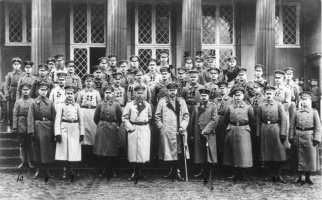Introduction↑
The Constitution of 1871 made the German emperor the nominal commander-in-chief of all land and naval forces in case of war. With mobilisation in August 1914, Wilhelm II, German Emperor (1859–1941) established the Große Hauptquartier (Great Headquarters). It comprised representatives of all political and military decision-making bodies. Within the Große Hauptquartier, OHL was set up under the command of Colonel General Helmuth Johannes Ludwig von Moltke (1848–1916).
Organisation↑
The OHL consisted of several sections. The Central Section was responsible for personnel matters. The Operations Section became split into Operations I (operations), Operations II (heavy artillery, munitions, and war economy), and Operations B (Balkan theatre) in 1916. The Political Section was responsible for military policy including matters of international law. Secret intelligence gathering, counterintelligence, censorship, and domestic propaganda fell under the jurisdiction of Subsection IIIb (upgraded to a full Section in 1915). The analysis and dissemination of IIIb's intelligence lay with the Nachrichtenabteilung (Intelligence Department; from 1917 onwards, called the Fremde Heere, or Foreign Armies). The year 1916 also saw the formation of the Militärische Stelle des Auswärtigen Amtes (Military Office of the German Foreign Office), which organised military propaganda in allied and neutral countries. The quartermaster general had been the chief of staff's primary advisor in prewar years. Now the position's main task had become supply, postal, and medical services, prisoners of war, and military jurisdiction.
Operations and Politics↑
From its inception through 14 September 1914, the OHL was headed by Helmuth von Moltke, who, after the defeat at the Marne, fell ill and was dismissed. His successor was the Prussian minister of war, General Erich von Falkenhayn (1861–1922), who remained in this position until 29 August 1916. His tenure saw the beginning of the stalemate on two fronts and the general offensive of the Entente in 1916. Following a series of internal clashes with Chancellor Theobald von Bethmann Hollweg (1856–1921), Falkenhayn was finally disbanded. Field Marshal Paul von Hindenburg (1847–1934) succeeded him, and Hindenburg’s aide General Erich Ludendorff (1865–1937) was made Erster Generalquartiermeister (first quartermaster general). At this point, the war had already turned into a total conflict with the third OHL taking command of large portions of the German war economy and domestic politics. The collapse of Russia in 1917 temporarily eased the difficult strategic situation, but the entrance of the United States into the war and the failure of the spring offensive of 1918 soon compensated for whatever relief the OHL had experienced. On 29 October, Ludendorff was dismissed by the emperor after a controversy over the question of an armistice, and General Wilhelm Groener (1867–1939) took his position. The task of this fourth OHL was not promising. The army had to be led back to Germany and demobilised. With the ratification of the Treaty of Versailles, Hindenburg resigned on 3 July 1919, and Groener led the High Command until its disbandment on 30 September 1919.
Conclusion↑
Like most general staffs in the First World War, the OHL faced the problem of commanding forces in sizes that had been hitherto unknown. The failure of the initial war plan in September 1914 was the result of this temporary loss of operational control. A first organisational response to this dangerous development was the introduction of an eastern front command (Oberbefehlshaber Ost or Ober Ost) in November 1914. But it did not take long before the different strategic preferences of OHL and Ober Ost resulted in new problems. Considering the magnitude of the task, and comparing OHL’s performance to the other belligerents’ high commands, the German General Staff proved a powerful military institution in the war machine of the empire. Nevertheless, this institution was neither constitutionally authorised nor equipped to direct the domestic politics and the war economy of Europe’s biggest industrialised nation-state. When it tried to do so, the consequences were fatal.
Markus Pöhlmann, Zentrum für Militärgeschichte und Sozialwissenschaften der Bundeswehr
Section Editor: Christoph Nübel
Selected Bibliography
- Afflerbach, Holger: Falkenhayn. Politisches Denken und Handeln im Kaiserreich, Munich 1996: Oldenbourg.
- Groß, Gerhard Paul: Mythos und Wirklichkeit. Geschichte des operativen Denkens im deutschen Heer von Moltke d. Ä. bis Heusinger, Paderborn 2012: Schöningh.
- Kitchen, Martin: The silent dictatorship. The politics of the German high command under Hindenburg and Ludendorff, 1916-1918, New York 1976: Holmes & Meier Publishers.
- Mombauer, Annika: Helmuth von Moltke and the origins of the First World War, Cambridge; New York 2001: Cambridge University Press.
- Nebelin, Manfred: Ludendorff. Diktator im Ersten Weltkrieg, Munich 2010: Siedler.
- Pyta, Wolfram: Hindenburg. Herrschaft zwischen Hohenzollern und Hitler, Munich 2007: Siedler.









